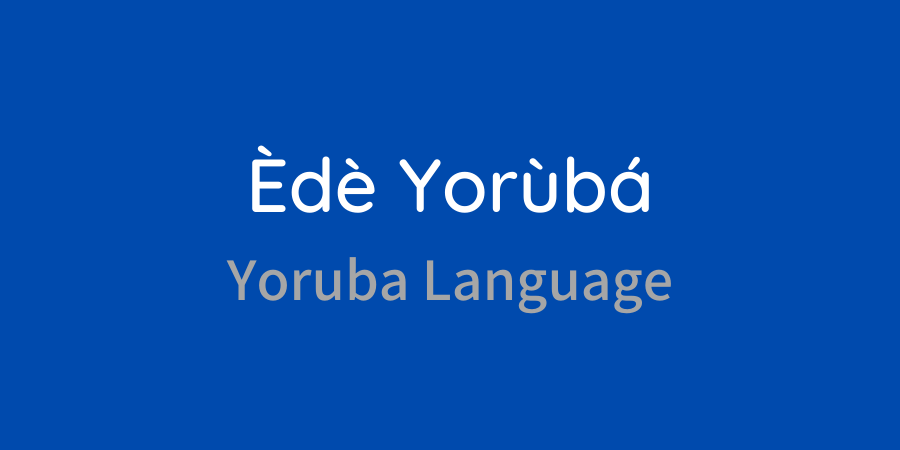UNIT 0
Welcome to UNIT 0, your starting point on the journey to learning Yoruba! This category is designed for absolute beginners eager to explore the beauty of the Yoruba language and culture. Whether you’re completely new to Yoruba or seeking to refresh your basics, UNIT 0 provides the foundational knowledge and resources you need to get started.
In UNIT 0, you’ll find introductory lessons covering essential topics such as basic greetings, pronunciation, common phrases, and cultural insights. We’ll guide you through step-by-step exercises and interactive activities to help you build a solid understanding of Yoruba fundamentals.
No prior experience is required – just bring your curiosity and enthusiasm to learn! Join us in UNIT 0 as we embark on an exciting journey into the rich tapestry of the Yoruba language and heritage.
Learn Yoruba for Beginners – Lesson 7 : Pronouns in Yoruba — Intensive pronoun
Introduction Hello everyone! This post’s focus is intensive pronouns. Some of these are myself, yourself, themselves etc. These types of pronouns emphasise the antecedent. In the Yoruba language, based on my very quick research, these pronouns are expressed in the following format : ara + subject pronoun If you want to know more about subject pronouns, […]
Learn Yoruba for Beginners – Lesson 6 : Pronouns in Yoruba — Possessive adjective (determiner)
Introduction In today’s article, we will be learning about possessive adjectives (determiner). Some of these are my, your, his, her, its, their etc. These are usually used to indicate possession and are placed before the noun in English but placed after the noun in Yoruba. Lesson My mi The format is as follows : [Noun] […]
Learn Yoruba for Beginners – Lesson 5 : Pronouns in Yoruba—Possessive pronoun
Introduction In this post, we will be briefly addressing possessive pronouns. Possessive pronouns like mine, yours, his, hers are useful to avoid repetition in your text. It replaces a noun that has a possessive pronoun (determiner). Let’s go. By the way, one thing I noticed after reading the book that is referenced below was that […]
Learn Yoruba for Beginners – Lesson 4 : Pronouns in Yoruba—Object pronouns
Introduction Object pronouns are pronouns that are often used as the direct or indirect object of the verb in the sentence. They are also defined as the pronouns on the receiving end of the action done by the verb. These pronouns are me, you, him, her, us and them. There are others, but only these will […]
Learn Yoruba for Beginners – Lesson 3 : Pronouns in Yoruba – Subject pronoun
Introduction Hello Yoruba language learners! In this blog post, you will be learning, as I am currently, how to express certain pronouns in the Yoruba language. Although not all forms of pronouns will be addressed in this post, i.e. object pronouns, reflexive pronouns etc., the focus is subject pronouns. For those who have left primary […]
Learn Yoruba for Beginners – Lesson 2 : How to greet someone in yoruba
Introduction How you greet someone may vary depending on the time of the day. Although the following is a list of the commonly known greeting phrases, one needs to add or remove certain pronouns depending on the other person listening to you. kúùrọ̀lẹ́ good evening káàárọ̀ good morning káàsán good afternoon […]
Learn Yoruba for Beginners – Lesson 1 : How to say the verb “to be”
Brief explanation if you want to say, someone is at a particular location, use the following template: [person] wà ni [location] The opposite would look like : [person] kò sí ni [location] On the other hand, if the person is going to another location, use: [person] lọ sí [location] Similarly, the opposite take this format : [person] […]
Learn Yoruba for Beginners – Lesson 0 : How to ask “where”?
Pattern Nibo [verb] [subject] Examples Where are we sitting? Níbo a joko ? Where are you? Níbo ni ẹ wà ? Where is your watch? Níbo ni agogo rẹ? Where are you from? Ọmọ ìlú ibo ni ẹ́? Where are we going? Níbo a lọ? Nibo la nlo? Where are you going? Níbo ẹ́ lọ ? Nibo le […]
5 free resources for learning the Yoruba language: Beginners
So why did I start learning Yoruba? Well, could you imagine a language-learning enthusiast, who has NO command over her heritage language? That is sad, tragic, disastrous, calamitous, catastrophic, etc. Over the years, I only had and still have basic knowledge of Yoruba thanks to the argumentative conversation of our parents or our mothers’ guilty […]







